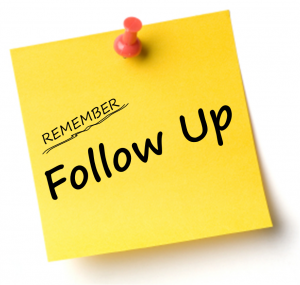The interview process can be a stressful one. The prep. The nerves. The waiting. One of the best ways to make it a little less stressful is to know that you’ve done all you can to stand out and impress your potential employer. That’s where follow-up comes in.
Why Follow Up?

Many people worry that following up after an interview will make them seem “desperate” or “pushy”, but in reality, a follow-up is a way to show that you are determined and proactive about your career, as well as thoughtful. While you may be worried about the etiquette of sending or not sending that follow-up email, your potential employer may be actively looking to see who does and does not follow up. Many employers can even consider the lack of a follow-up to be a sign that you are disinterested, so if you want the job, you’ve got to make it known. Be your own PR person, put your best foot forward, and follow up!
Ways To Follow Up

There are several different ways you can go about following up after an interview. You may decide to email, call, send a letter, or give a thank you gesture. Plan ahead and make sure you ask for a business card before you leave, that way you will know how your potential employer can be contacted, and perhaps how they would prefer to be contacted, depending on what information the card provides.
Follow Up Email
A quick email to thank your interviewer for having you, reminding them of why you are a great pick for the job, and asking any questions you may have forgotten to ask is a great way to follow up after an interview. The speed of an email also makes it ideal because you aren’t letting too much time pass after you’ve spoken.
Follow Up Call
A call can be an effective and personal follow-up, especially if this is not your first interview. Be sure that in a follow-up call you took time to think about what you would like to say. If you are worried about misspeaking jot down some notes to keep on hand while you make the call. That way you can check-in and make sure you are staying on point.
Follow Up Letter
Because a letter will take a bit to arrive, they are best saved for following up down the line. Sometimes developing a working relationship takes time, and that’s when a letter follow-up works best. A follow-up by mail can also be a great way to keep those you’ve met up to date with what new projects you are working on.
Follow Up Gestures
While something extravagant can make it seem like you are trying to buy a job, or something inconvenient (like a plant) can be annoying, a small, easy to accept gesture can be a great way to make your follow-up stand out. Keep it simple. Think of how you would feel in the position of the person who interviewed you. Try something convenient and thoughtful, like our Thnks-A-Latte gesture! A Venti cafe latte with a double chocolate chunk brownie is a delicious way to say thank you for your time, and include a quick personalized note to make yourself stand out. Plus with Thnks, if a company has a policy about accepting gestures or they feel uncomfortable doing so, anyone on the receiving end of a Thnks gesture can opt to donate the value of their gesture to any charitable cause they choose.
Check out “Thnks a Latte” here!
Follow Up Do’s

Continue the Conversation
Try to match the tone of your interview with the tone of your follow-up. If you had a somewhat familiar and casual conversation, don’t respond with an overly formal follow-up email. On the other hand, if you felt your interview was particularly serious and to the point, a follow-up shouldn’t be used as a chance to suddenly get chummy. You are following up in order to continue the conversation, not change it.
Double-Check
It may sound like a no-brainer, but you’ve got to proofread! The last thing you want to do is hit send and miss any easy mistake that might undermine all your hard work. Run spell check, read it over a few times. It can also be helpful to send a draft to someone whose option you trust to get feedback.
If You Don’t Know, Ask!
Following up after an interview is also a great opportunity to ask any questions you may have forgotten to ask during the interview, and now thought of since the interview ended. During a phone interview, it’s helpful to keep notes as you speak, that way you can draw from those specifics when you go to follow up.
Follow Up Don’ts

No Apologies
Steer clear of apologies, even if you feel you messed up during your initial interview. The point of the follow-up is to highlight your qualifications and interest, not remind them of something you regret saying that for all you know they may have already forgotten about. Play the odds that their memory of you is already a positive one. No matter how the interview itself went, a follow-up is an opportunity to leave a quick, positive impression.
Don’t Wait
Don’t make the mistake of waiting too long. Make sure to follow up within the first 24 hours after an interview so that you are fresh in their minds. Think of follow-ups as a polite and professional version of popping your head back in the door and saying “Remember me?”.
Keep it Quick
Don’t write a book in your follow-up email. It’s important to keep any follow-up concise. It’s a quick thank you, a short recap: not a second interview.
Why Follow Up After a Phone Interview?

Following up after a phone interview is particularly important because many employers use phone interviews early on in the hiring process, and you may be one of a very large pool of potential employees. Because you haven’t had a chance to meet face to face, a follow-up email post-phone interview can help to solidify you as a real, tangible person, not just a voice on the phone.
Following Up When You Haven’t Heard Back
Haven’t heard back? Sometimes it can take longer than you expected to get feedback from an interview, and while it is important to be patient, it’s also acceptable to check-in. Be sure to ask around how long they expect to take to make their decisions, and when you should look to hear from them. That way you don’t have to stress about how long to wait. Once that date has come and gone it is totally ok to check-in. Sometimes a company may just have underestimated the time their interview process would take. Other times you may just not be right for the job. But either way, it will show that your interest in the job is real, and while hopefully giving you some closure, may also leave an impression that leads to something else in the future.
Following Up When There Isn’t a Job on the Line
We’ve mostly talked about following up after an interview for a new position, but don’t forget the importance of following up with a business associate you may already work with. Any meeting or conversation that enhances your professional life can be worthy of a thank you. Letting people know that you appreciate their time and expertise is just as valuable as impressing someone new. When your follow-up is more of a thank you than an additional sign of interest it’s an especially great time to share a token of your appreciation. And if someone you know set up an interview or made an introduction? They definitely deserve a thank you gesture!
No matter how you feel most comfortable following up after an interview, it’s important to do. By following up you are making it clear to your potential employer that you are determined, dedicated, thoughtful, and professional. You aren’t just making it clear that you want a job, you are setting a positive precedent for your business relationship in the future. And don’t stress too much about being perfect. Best case scenario you solidify yourself as the front-runner for a new job. Worst case scenario, you didn’t get it, but you’ve left the impression of a quality person who could be worth bringing back in for a future position.